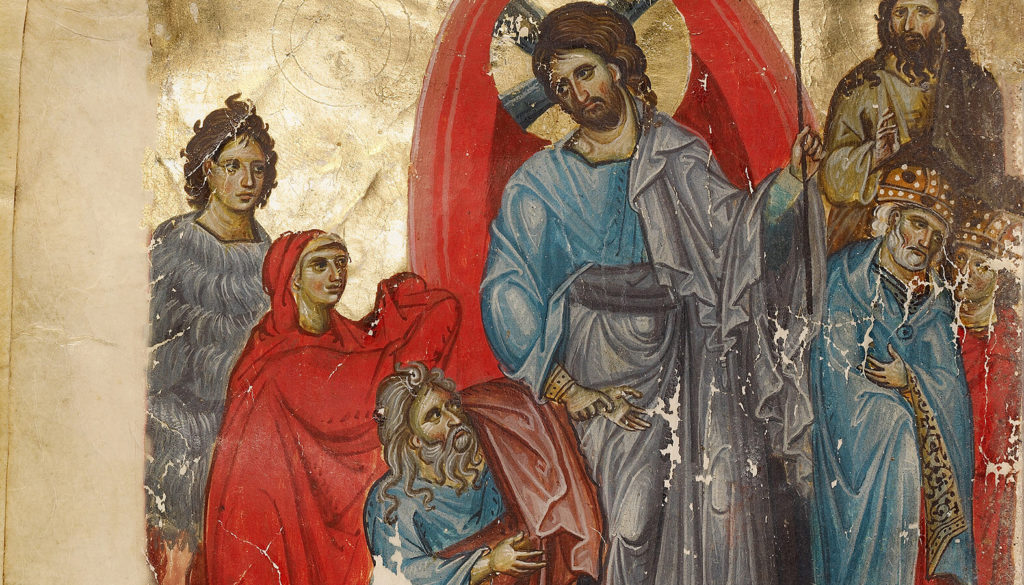What a privilege it is every spring to immerse oneself in the liturgies of Holy Week. The washing of the feet on Holy Thursday, the veneration of the cross on Good Friday, the journey through the pivotal readings from the Old Testament during Saturday’s Easter Vigil, the joyful resurrection of the “Alleluia” on Easter Sunday—all of it is meant to plunge us into the mystery of the dying and rising of the Lord Jesus.
At several points during the recent celebrations, I was reminded of a saying of my mentor, Cardinal Francis George of Chicago. It kept coming into my mind as a sort of mantra or refrain, prompted by so many of the gestures and readings of Holy Week. The Cardinal once famously commented that we live in a culture where “everything is permitted and nothing is forgiven.” In the typical Georgean manner, the saying is pithy, memorable, and dead right. Even the most casual survey of our society discloses the truth of the first part of the Cardinal’s adage. Men are allowed to be women, and women men. Male athletes, claiming a female identity, can dominate women’s sports. Transgender surgery, even when it amounts to the mutilation of children, is positively encouraged in many parts of our country, including my home state of Minnesota. Abortion, even to the moment of birth, is legal (indeed celebrated) in a number of states; assisted suicide of the suffering is considered a fundamental right of the individual and prerogative of the state.
But the truth of the second part of the Cardinal’s statement is equally obvious. Violations of the accepted secular orthodoxy today result in cancellation, elimination, permanent ostracization. If you doubt me, try posting something even mildly anti-woke on the internet. The Jacobin mob will be on you in moments. And if you read the ideologues behind wokeism, you will see that being, say, a white male, or an advocate of traditional religious values, makes you permanently a reprobate with no hope of redemption. If you doubt me on this score, ask any woke enthusiast just how much apology or reparation is required to relieve an offender of his guilt. You will find that the answer is “never enough.” So, on the one hand, everything seems to be permitted, but on the other hand, nothing is ever really forgiven.
I thought of Cardinal George’s bon mot during Holy Week because the dying and rising of Jesus reveals precisely the reverse of what obtains in our secular culture. During the Holy Week liturgies, especially on Holy Thursday and Good Friday, we see practically all forms of human dysfunction. What brought the Lord to the cross was a demonic farrago of hatred, stupidity, violence, cruelty, institutional injustice, self-serving careerism, betrayal, denial, and gross indifference to the will of God. Though many of those responsible for the death of Jesus wrapped themselves in the mantle of righteousness or offered pathetic justifications for their behavior, in fact, all of them were exposed as frauds and sinners. The cross itself served as judgment on human folly and wickedness. In its light, there was no chance to hide. Of course, we would all love to live in a society where everything is permitted, where no decision of ours is ever subject to question or correction, where “I’m okay and you’re okay.” But the cross of Jesus stands athwart all of this. It shines an unsparing light on our sin, especially our hidden sin; it convinces us, beyond doubt, that we are not okay. And this is all to the good, for if we never admit to sin, we will never be open to salvation.
At the same time, the accounts of the Resurrection of the Lord disclose the opposite of the cancel culture. To the very people who had denied, betrayed, and abandoned him, Jesus does indeed show his wounds, lest they forget their sin, but then he utters the incomparably beautiful word “Shalom.” In any conventional telling of a story like this, the offended man, back from the dead, would certainly be intent upon revenge. But in the Gospel story, the man who had been hurt as fully as a person can be hurt, returned in forgiving love. And let us press the point, for the person in question was not only a man but also true God. Therefore, they killed God and God offered a word of peace and reconciliation. If any people in the history of humanity deserved to be cancelled, it was all those who contributed to the death of Jesus, but instead they are forgiven. And this means (and it is the Good News of the Gospel that applies to every person up and down the ages) that every sin is forgivable, that God cancels no one.
And so, to the cancel culture that says, “Everything is permitted but nothing is forgiven,” we Christians should counter, “In light of the cross, we know that many things ought not be permitted,” and in light of the Resurrection, that “everything in principle can be forgiven.” In that reversal of the present orthodoxy, we find a truly saving word.

